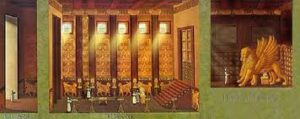David’s Plans for the Temple
First Chronicles 28: 1-8
David’s plans for the Temple DIG: What preparations had David made for Solomon to build the Temple? How has David’s life and faith enriched us today? What parallels can be drawn between the building of the Temple and the buildings of the church or messianic synagogue?
REFLECT: Ultimately, serving ADONAI is what’s important, and an organized building project is valuable only to the extent that it contributes to the LORD’s service. How can you contribute to your place of worship for God’s glory?
970 BC
No amount of human effort and organization can take the place of heartfelt approval of ADONAI. David was going to die soon. An inexperienced son would follow him, and the construction of the Temple was a task far beyond any one man or group of men. Apart from the blessing of the LORD, the people couldn’t possibly hope to succeed. Leaders come and leaders go, but YHVH remains forever, and we serve an audience of One.538
David had already communicated to Isra’el’s leaders his desire to construct the Temple of ADONAI. In fact, he had already started collecting the building materials (to see link click Ep – David Makes Preparations for the Temple). Now, with the end of his life imminent, David summoned all the officials of Isra’el (already mentioned in First Chronicles Chapters 23-27) to assemble at Jerusalem: the officers over the tribes, the commanders of the divisions in the service of the king, the commanders of the thousands and commanders of hundreds, and the officials in charge of all the property and livestock belonging to the king and his sons, together with the palace officials, the warriors and all the brave fighting men (First Chronicles 28:1).

It’s good for people to know the heart of their leader and how God has worked in his or her life. Then David reviewed the history of his own attempts to build the Temple. King David rose to his feet and said: Listen to me, my fellow Israelites, my people. I had it in my heart to build a house as a place of rest for the ark of the Covenant of YHVH (see Cu – ADONAI Swore an Oath to David), for the footstool of our God (see the commentary on Exodus Fs – The Mercy Seat in the Most Holy Place: Christ at the Throne of Grace), and I made plans to build it. But God said to me, “You are not to build a house for my Name, because you are a warrior and have shed blood” (First Chronicles 28:2-3). David’s public announcement corresponded to what he had already told Solomon privately (First Chronicles 22:7-16).
He emphasized that it was the LORD who chose and anointed him, and who chose Solomon to be his successor. Yet ADONAI, the God of Isra’el, chose me from my whole family to be king over Isra’el forever. He chose Judah as leader and from the tribe of Judah he chose my family, and from my father’s sons he was pleased to make me king over Isra’el. Of all my sons – and YHVH has given me many – He has chosen my son Solomon to sit on the throne of the kingdom of the LORD over Isra’el. He said to me, “Solomon your son is the one who will build My house and My courts, for I have chosen him to be My son, and I will be his Father. He reminded the leaders of God’s gracious Covenant with the house of David (see Ct – The LORD’s Covenant with David), and their responsibility to obey the Torah. God declared: I will establish his kingdom forever if he uses his strength to obey my mitzvot and abide by my rulings, as [he is doing] currently. If Isra’el kept the terms of the Covenant and obeyed Ha’Shem, He would keep His promises and bless the nation. They would possess the Land and enjoy its blessings. Then David concluded his remarks: Now therefore, in the sight of all Isra’el, the community of ADONAI, and in the hearing of our God, observe and seek out all the mitzvot of ADONAI your God, so that you may continue to possess this good Land and leave it as an inheritance to your descendants after you forever (First Chronicles 28:4-8 CJB).
Unfortunately, Solomon eventually failed to live up to God’s high standard (First Kings 11:1-11). Between God’s words to Solomon . . . will build my house, and I have chosen him to be My son, the full prophecy of Nathan had originally included an intervening statement that shifted the point of reference beyond Solomon to the more distant future when the prophet said: I will establish his throne forever. I will be His Father and He will be my Son. I will never take my love away from Him, as I took it way from [Sha’ul]. I will set Him over My house and My Kingdom forever; his throne will be established forever (First Chronicles 17:12-14). That is, Solomon did not achieve the fulfillment of true sonship to God the Father, it was an ideal that could only be seen in Yeshua Messiah.539



Leave A Comment